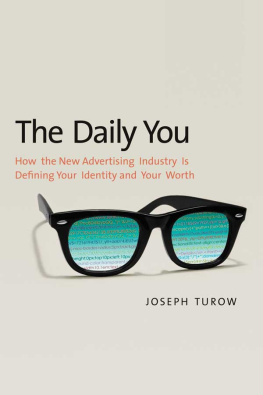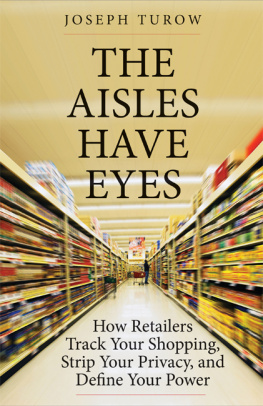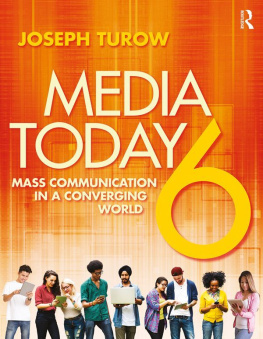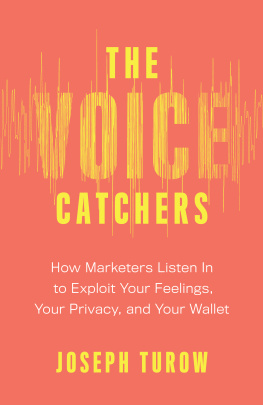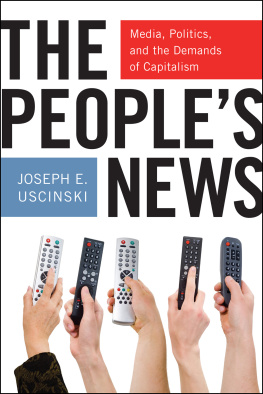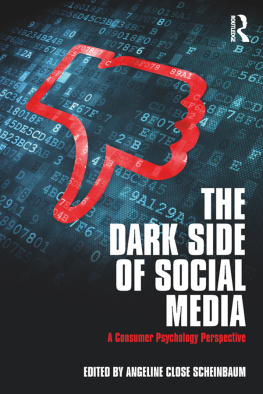


Copyright 2011 by Joseph Turow.
All rights reserved.
This book may not be reproduced, in whole or in part, including illustrations, in any form (beyond that copying permitted by Sections 107 and 108 of the U.S. Copyright Law and except by reviewers for the public press), without written permission from the publishers.
Yale University Press books may be purchased in quantity for educational, business, or promotional use. For information, please e-mail (U.K. office).
Set in Adobe Garamond and Stone Sans types by IDS Infotech Ltd.
Printed in the United States of America.
Library of Congress Cataloging-in-Publication Data
Turow, Joseph.
The daily you : how the new advertising industry is defining your identity and your worth / Joseph Turow.
p. cm.
Includes bibliographical references and index.
eISBN: 9780300166521
1. Consumer profiling. 2. MarketingTechnological innovations. 3. Customer servicesTechnological innovations. 4. Advertising. I. Title.
HF5415.32.T945 2011
659.1dc23
2011028202
A catalogue record for this book is available from the British Library.
This paper meets the requirements of ANSI/NISO Z39.481992 (Permanence of Paper).
10 9 8 7 6 5 4 3 2 1
To Judy
Contents
Acknowledgments
This book explores a new advertising industry in the making and its effect on how we see ourselves and our world. I owe a lot to the many business practitioners, journalist-experts, and public-interest advocates who answered my questions about the thicket of technology, business processes, and government policies that are guiding the fascinating transformation. Several of these generous individuals wished to remain anonymous. I am thankful for the opportunity to acknowledge the others together with the firms that employed them when we talked: Matt Apprendi (Collective Media), Don Batsford Jr., (31 Media), Denis Beaujejour (Mariemount Community Church), JC Cannon (Microsoft), Jeffrey Chester (Center for Digital Democracy), Stephanie Clifford (New York Times), Peter Eckersley (Progress and Freedom Foundation), Carol Garofalo (Collective Media), Bob Gellman (privacy consultant), Alec Gerster (Initiative), Matt Greizer (Razorfish), David Hallerman (eMarketer), Saul Hansell (New York Times), Eduardo Hauser (DailyMe), Darren Herman (Varick Media Management), Tom Hespos (Underscore Marketing), Imran Iziz (Microsoft), Brad Johnson (Advertising Age), Michael Katz (Interclick), Joakim Kent (Omniture), Yaakov Kimelfeld (Mediavest), Scott Lang (WPP), Jeremy Lau (Real Networks), Edmund Lee (Advertising Age), Ying Lee (Microsoft), Kirk McDonald (Time Inc.), Jack Neff (Advertising Age), John Nitti (Zenith Optimedia), Eric Picard (Microsoft), Ariel Poler (TextMarks), Jules Polonetsky (Future of Privacy Forum), Andy Pratkin, (WPP), Paul Rostoski (LucidMedia), Marc Rotenberg (Electronic Privacy Information Center), Jay Sears (ContextWeb), Ted Shargalis (X+1), Dou Shen (Microsoft), Mark Stewart (Kraft), Michael Stich (Bridge Worldwide), Rohit Thawani (Publicis), Rishad Tobaccowala (Publicis), Jonathan Trieber (RevTrax), Nat Turner (Invite Media), Kurt Unkle (Publicis), Tim Westergren (Pandora), Brian Wieser (Magna), Debra Aho Williamson (eMarketer), and Edwin Wong (Yahoo!).
In many cases, I contacted sources because they were mentioned in, or wrote, helpful articles I read in trade magazines or because they appeared on panels at industry meetings I attended. The industry meetings were useful for confirming, extending, or refuting what I learned in the trades. I have been reading Advertising Age for decades (I started subscribing as a teenager), and I have been a regular visitor to online newsletters about the ad-driven digital world such as Online Media Daily, PaidContent.org, and AdExchanger from virtually their inception. In addition, the Nexis and Factiva databases have made it practical to explore particular topics in depth across a wide range of industry periodicals (such as Adweek, Multichannel News, and Progressive Grocer) and government-agency publications. I have also benefited from reports from media and marketing consulting and research firms such as Forrester Research, eMarketer, Bernstein Research, and Magna. The Omniture advertising-optimization company kindly let me study its Test and Target training manual. I am also grateful for the many explanatory reports and white papers that firms in the digital-marketing space released during the past several years.
Colleagues from various academic disciplines have been crucial to teaching me, critiquing my ideas, and offering sage advice about various aspects of marketing, the digital environment, and/or privacy. Warm thanks are due to Jack Balkin, Pablo Boczkowski, Danielle Citron, Laurie Cranor, Peter Decherney, Peter Fader, Ellen Goodman, James Grimmelmann, Keith Hampton, Eszter Hargitai, Chris Jay Hoofnagle, Elihu Katz, Jennifer King, Greg Lastowka, Matt McAllister, Aleecia McDonald, Kathy Montgomery, Monroe Price, Sheizaf Rafaeli, Rivka Ribak, Jonathan Smith, Jeffrey Sonstein, Lokman Tsui, Joel Waldfogle, Kevin Werbach, and Christopher Yoo. My thinking on topics in this book has also benefited from research help by students Aymar Jean Christian, Deb Lieu, Alex Sastre, and Nora Draper at the University of Pennsylvania's Annenberg School for Communication.
Michael Delli Carpini, dean of the Annenberg School, has provided an encouraging environment for research through his personal style and his adjustment of the faculty course load with an eye toward the production of knowledge. A sustained amount of my writing took place at Oxford University via a Lady Astor Lectureship from the university. I'd like to thank Professor William Dutton of the Oxford Internet Institute, who was a supportive host. Thanks also go to Jeffrey Schier, my copyeditor, whose meticulous reading (and rereading) of the manuscript led him to ask penetrating questions and offer valuable suggestions. Alison MacKeen, my editor at Yale University Press, has been kind, critical, demanding, astute, and extremely encouragingall at the same time. I am very fortunate to be working with her.

Introduction
At the start of the twenty-first century, the advertising industry is guiding one of history's most massive stealth efforts in social profiling. At this point you may hardly notice the results of this trend. You may find you're getting better or worse discounts on products than your friends. You may notice that some ads seem to follow you around the internet. Every once in a while a website may ask you if you like a particular ad you just received. Or perhaps your cell phone has told you that you will be rewarded if you eat in a nearby restaurant where, by the way, two of your friends are hanging out this very minute.
You may actually like some of these intrusions. You may feel that they pale before the digital power you now have. After all, your ability to create blogs, collaborate with others to distribute videos online, and say what you want on Facebook (carefully using its privacy settings) seems only to confirm what marketers and even many academics are telling us: that consumers are captains of their own new-media ships.
Next page
